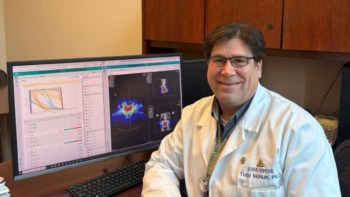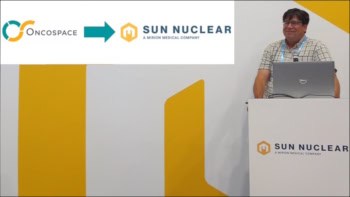Available to watch now, LAP GmbH Laser Applikationen explores the critical role of PSQA in ensuring accurate dose delivery for VMAT treatments, the potential of 3D dose calculation systems to optimize PSQA and reduce treatment times, and how 3D dose calculation compares with traditional measurement-based approaches for breast cancer treatment
Want to learn more on this subject?
In this webinar, we will discuss that patient specific quality assurance (PSQA) is an essential component of the radiation treatment process. This control allows us to ensure that the planned dose will be delivered to the patient. The increasing number of patients with indications for modulated treatments requiring PSQA has significantly increased the workload of the medical physics departments, and the need to find more efficient ways to perform it has arisen.
In recent years, there has been an increasing evolution of measurement systems. However, the experimental process involved imposes a limit on the time savings. The 3D dose calculation systems are presented as a solution to this problem, allowing the reduction of the time needed for the initiation of treatments.
The use of 3D dose calculation systems, as stated in international recommendations (TG219), requires a process of commissioning and adjustment of dose calculation parameters.
This presentation will show the implementation of PSQA based on independent 3D dose calculation for VMAT treatments in breast cancer using DICOM information from the plan and LOG files. Comparative results with measurement-based PSQA systems will also be presented.
An interactive Q&A session follows the presentation.
Want to learn more on this subject?

Dr Daniel Venencia is the chief of the medical physics department at Instituto Zunino – Fundación Marie Curie in Cordoba, Argentina. He holds a BSc in physics and a PhD from the Universidad Nacional de Córdoba (UNC), Daniel has completed postgraduate studies in radiotherapy and nuclear medicine. With extensive experience in the field, Daniel has directed more than 20 MSc and BSc theses and three doctoral theses. He has delivered more than 400 presentations at national and international congresses. He has published in prestigious journals, including the Journal of Applied Clinical Medical Physics and the International Journal of Radiation Oncology, Biology and Physics. His work continues to make significant contributions to the advancement of medical physics.

Carlos Bohorquez, MS, DABR, is the product manager for RadCalc at LifeLine Software Inc., a part of the LAP Group. An experienced board-certified clinical physicist with a proven history of working in the clinic and medical device industry, Carlos’ passion for clinical quality assurance is demonstrated in the research and development of RadCalc into the future.





